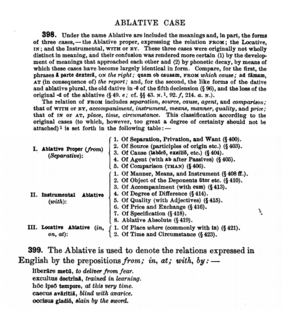
Back حالة الاجتثاث Arabic Çıxışlıq hal Azerbaijani Ablativ BAR Аблатив Bulgarian অপাদান কারক Bengali/Bangla Troad ablativel Breton Ablativ BS Cas ablatiu Catalan Ablativ Czech Ablativ Danish
This article needs additional citations for verification. (September 2013) |

In grammar, the ablative case (pronounced /ˈæblətɪv/ AB-lə-tiv; sometimes abbreviated abl) is a grammatical case for nouns, pronouns, and adjectives in the grammars of various languages; it is sometimes used to express motion away from something, among other uses. The word "ablative" derives from the Latin ablatus, the (suppletive) perfect, passive participle of auferre "to carry away".[1]
The ablative case is found in several language families, such as Indo-European (e.g., Sanskrit, Latin, Albanian, Armenian, Punjabi), Turkic (e.g., Turkish, Turkmen, Azerbaijani, Uzbek, Kazakh, Kyrgyz, Tatar), Tungusic (e.g., Manchu, Evenki), Uralic (e.g., Hungarian), and the Dravidian languages. There is no ablative case in modern Germanic languages such as German and English. There was an ablative case in the early stages of Ancient Greek, but it quickly fell into disuse by the classical period.
- ^ "The Ablative" (PDF). The Latin Library. Archived (PDF) from the original on 9 October 2022. Retrieved 14 January 2006.
© MMXXIII Rich X Search. We shall prevail. All rights reserved. Rich X Search